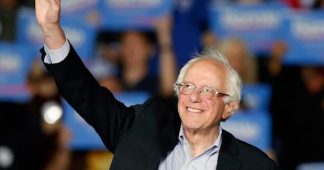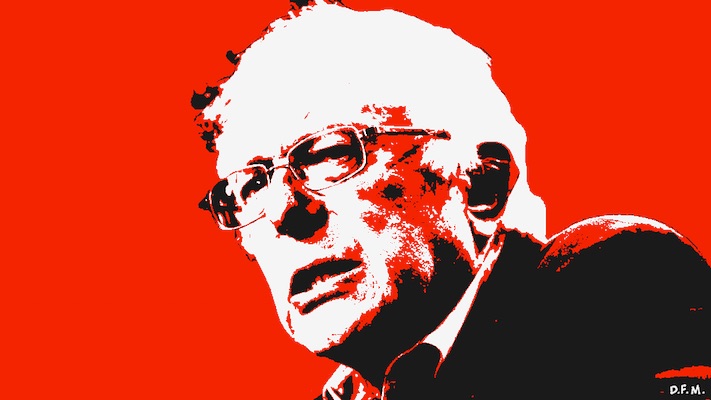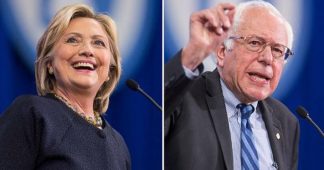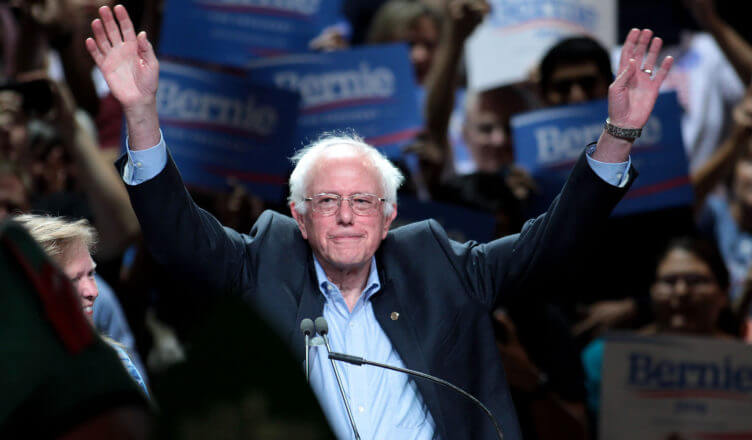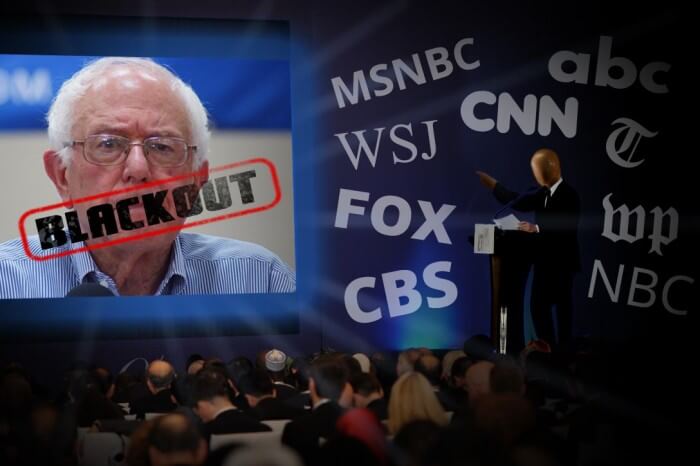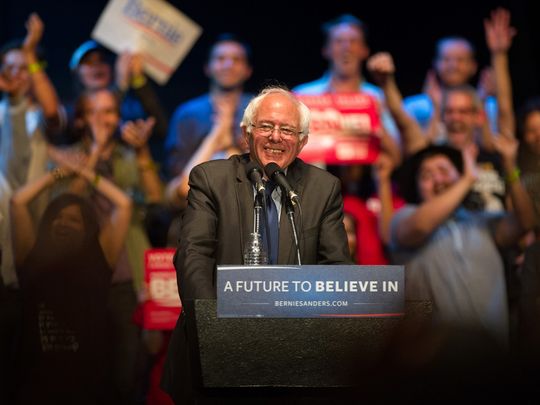By
Since the US political establishment began taking seriously the threat posed by Bernie Sanders’ presidential candidacy in recent months, the self-proclaimed “democratic socialist” senator has faced an endless barrage of red-baiting attacks.
On several occasions, Sanders’ social democratic program has been likened to Venezuela and other Latin American countries of the so-called “pink tide”, conjuring up the now routine images of apocalyptic economic meltdown replayed ad nauseum by corporate media outlets.
Sanders, for his part, has emphatically denied the comparisons– not without a small amount of red-baiting himself– preferring to draw his inspiration from Scandinavian social democracy, where a strong capitalist state guarantees a host of key social welfare provisions for its largely homogenous populace.
“We’re not talking about Venezuela, we’re not talking about Cuba. We are talking about the concept, which I don’t think is a radical idea, of having a government which works to represent the needs of the middle class and working families rather than just the top 1 percent,” the Democratic presidential contender explained at a recent forum hosted by Telemundo.
These assertions aside, there is, however, something about Sanders’ left populist crusade against the “billionaire class” that is much more at home in Caracas than in Copenhagen.
In search of the plebs
In 1998, a young former military officer by the name of Hugo Chávez won the presidency of Venezuela campaigning on a third party platform that pledged to reclaim the country from the oligarchy and rewrite the constitution to reflect the interests of the impoverished majority.
While operating in a vastly different socio-political arena, Bernie Sanders has similarly sought to repolarize the US political field along the lines of an irreconcilable antagonism between “working people” and the oligarchy or “1 percent”.
Just as in Venezuela following the Caracazo*, this fault line has been emerging for some time– product of the savage neoliberal turn undertaken by the Carter-Reagan-Clinton triumvirate– only erupting fully into public view with the Occupy movement and its rediscovery of class struggle conceived in terms of “the 99% versus the 1%”.
Following Chávez, Sanders has given mainstream political expression to this antagonism: his campaign embodies the possibility of constructing a collective political actor that unifies the particular demands of a diversity of subaltern groups (Blacks, Latin@s, LGBTQ people, etc.) into a counter-hegemonic challenge to the dominant neoliberal power bloc.
This is hardly to suggest that there has yet emerged in the US a new anti-oligarchic political subject encompassing the oppressed and excluded masses that is capable of disputing hegemony– the plebs in the terminology of the Argentine-Mexican philosopher Enrique Dussel.
Yet, it is undeniable that the Vermont senator’s indignant railings against the power of Wall Street– a metonym for the hegemonic neoliberal bloc– has galvanized multitudes of formerly depoliticized people in the US in a way not seen in at least a generation.
From ballooning student debt to Citizens’ United, Sanders has succeeded in crafting a coherent narrative that links a broad range of social issues to neoliberalism and prescribes a clear and convincing set of social democratic solutions, such as single payer healthcare, free college tuition, and public financing of electoral campaigns.
As Sanders himself admits, there is nothing particularly radical or revolutionary about his mild social democratic program, which is more evocative of Eisenhower than his hero Eugene V. Debs. Nonetheless, his synthesis of this multiplicity of social demands under the banner of “democratic socialism” should not be dismissed as a mere ‘60s social democratic reprise.
The building of a multi-racial, anti-neoliberal coalition including working class whites, whom liberals had dismissed as long lost to the Right, represents an earthquake in the US political landscape that points to the real possibility of forging the plebs– or the “99 percent” in our post-Occupy lexicon– as a concrete political force able to unseat neoliberal hegemony.
This process mirrors– albeit on a very embryonic level– that led by Hugo Chávez in the 1990s whereby the Venezuelan leader succeeded in building a diverse coalition of social movements, trade unions, progressive military personnel, and leftist parties behind his platform of a constituent assembly, which he described as a “political revolution” that would empower the oppressed and excluded majority to refound the country.
Nonetheless, there are serious limitations in this nascent movement linked to Sanders’ presidential bid.
In the 1990s, Venezuela was already fractured by the Manichean antagonism between the oligarchy and the plebs, which fully erupted into public view during the 1989 Caracazo uprising against neoliberal austerity that was brutally repressed by the military with between three and five thousand people massacred.
Whereas Hugo Chávez is the “son” of that popular, counter-hegemonic mass whose rebellion brought down the oligarchic ancien regime, splintering Venezuelan history in two, Bernie is a moment in the widening Manichean fissure– produced by the savage inequalities of neoliberal capitalism– out of which the plebs may very well emerge in the coming decades.
The Democratic dead-end
Evidently, the Sanders candidacy is not without major shortcomings in its emancipatory prospects, the most glaring of which is its basic nature as an insurgent campaign waged from within the Democratic Party.
Whereas leftist Latin American political processes saw the founding of new political parties to give voice to burgeoning movements from below, the Sanders phenomenon is a top-down campaign to become the presidential candidate of what former Nixon advisor Kevin Phillips called “history’s second most enthusiastic capitalist party”.
While Bernie has quite effectively used the platform of the Democratic primary to carry his message to the national stage– an objective which would have been unachievable otherwise– his candidacy poses important questions as to what extent the party can be a vehicle for leftist electoral ambitions.
The project of democratizing the Democratic Party and converting it into a social democratic instrument for progressive change in the US is not new, and its failure has been thoroughly analyzed.
Since FDR, the Democrats have become the party of major transnational, capital-intensive fractions of the capitalist class, a fact that remains truer than ever, as evidenced by overwhelming establishment preference for Bill Clinton, Barack Obama, and now Hillary Clinton.
Moreover, unlike Jeremy Corbyn’s Labour Party– which as a political instrument originally created by the British working class, retains key aspects of internal democracy that render it a terrain of struggle– the Democratic Party has always been a purely bourgeois electoral vehicle whose corporate funding, highly decentralized nature, and absence of organic trade union ties leaves few footholds for insurgent left-wing takeover.
In this context, Sanders’ candidacy is invaluable insofar as it serves to heighten the contradictions within the Democratic Party, forcing Hillary Clinton and the entire party establishment to out themselves as ossified neoliberals hell-bent on crushing even the most tepid of social democratic proposals such as Medicare-for-all.
Nonetheless, these gaping contradictions that have opened up between the progressive content of Bernie’s campaign and the incorrigibly neoliberal character of the Democratic Party ultimately become antagonistic in the very likely scenario that the Vermont senator loses the primary and endorses Hillary Clinton as he has previously pledged.
The quite probable– though by no means guaranteed– coronation of Clinton represents something of a strategic dead-end for leftists sympathetic to Bernie, with the former secretary of state aiming to channel the progressive, anti-establishment energy unleashed by the Sanders campaign towards her project of shoring up neoliberal hegemony on the basis of the most reactionary brand of identity politics.
While a Clinton presidency will likely mean the temporary demobilization of the left as occurred under Obama, the specter of class struggle can never be permanently swept under the rug so long as neoliberal capitalism continues to multiply the ranks of the oppressed and excluded.
A plebs’ president?
Nevertheless, in the hypothetical event that he wins the nomination and the presidency, will Bernie be able to enact his “political revolution”?
Perhaps this is all-together the wrong question, for as Hugo Chávez famously put it in his iconic “strike at the helm” speech shortly before his untimely death, “Socialism cannot be made by decree.”
That is, revolutions, as every committed leftist militant understands, are not reducible to the mere act of ousting the existing government and installing a new one. On the contrary, they seek to undertake the lengthy bottom-up transformation of the state as a social relation.
Here Sanders’ Scandinavian social democratic model reveals its sharp limitations, confusing “democratic socialism” with universal social programs vertically administered by the capitalist state.
For Chávez, true democratic socialism is by definition participatory, meaning that the plebs must come to gradually supplant the capitalist state with their own self-governance organs, including communal councils, workers’ control, and eventually communes.
In this sense, the condition of possibility for initiating a revolutionary sequence in the US is not just a progressive candidate such as Sanders, but as Bill Fletcher points out, a revitalized array of left-wing movements capable of exercising power from below with a strategic vision towards transforming the state.
Leftists must not only rebuild a radicalized trade unionism and displace the Democratic Party at state and local levels, but most crucially, we must take in the lessons from Latin America’s response to neoliberalism and firmly root these efforts in participatory democratic community structures, such as neighborhood assemblies, whereby poor and working class people can learn to self-govern.
None of this, of course, can be accomplished without fierce popular struggle, a fact that simply does not square with Sanders’ vision of a calm, orderly “political revolution” achieved by way of the Democratic Party.
In Latin America, the rise of leftist and progressive governments over the past seventeen years only followed decades of grassroots organizing punctuated by key moments of popular revolt, such as the 2003 Bolivian Gas War, the 2001 Argentinazo, and the 1989 Venezuelan Caracazo.
In response to the “state of exception” imposed by US imperialism and local oligarchic elites, these pueblos responded with their own “state of rebellion”, which as Dussel argues, unmasked the utter illegitimacy of the neoliberal state.
Viewed through this lens, emancipatory struggles in the US still have a long way to go.
From Occupy to Black Lives Matter and beyond, the oppressed and excluded majority trapped in what Che Guevara called the “belly of the beast” have only taken their tentative first steps in a protracted war of position which is sure to last decades.
Regardless of the ultimate outcome, the Sanders campaign undoubtedly marks a watershed moment in this counter-hegemonic process, demonstrating that hundreds of thousands of people nationwide– including 1 in 4 voters in the Confederate cradle of South Carolina– are willing to support a self-proclaimed “socialist” candidate.
* The 1989 popular rebellion which saw Venezuela’s poor and excluded majority rise up against the IMF (International Monetary Fund) structural adjustment package imposed by President Carlos Andres Perez
